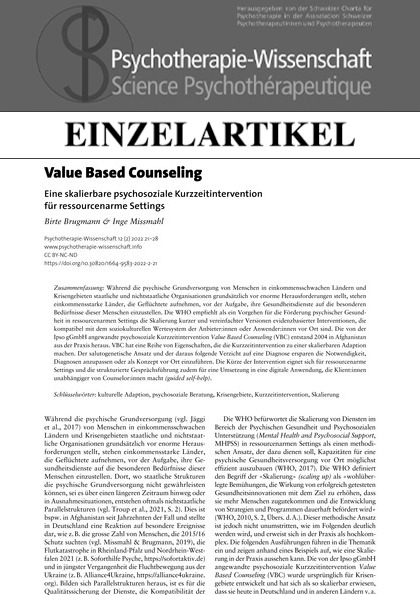Value Based Counseling
A scalable psychosocial intervention for resource-poor settings
DOI:
https://doi.org/10.30820/1664-9583-2022-2-21Keywords:
communities affected by adversity, cultural adaptation, psychosocial counseling, short-term intervention, upscalingAbstract
The provision of basic mental health care is particularly challenging in low-income countries and when communities are affected by adversity such as natural disasters or wars. Mental health services in high-income countries may also be challenged if they need to adapt their health services with the aim of serving refugees effectively. The WHO recommends the scaling up of brief, basic, non-specialist-delivered versions of existing evidence-based psychological interventions which are compatible with the socio-cultural value system of the local provider or user in resource-poor settings. The psychosocial short-term intervention Value Based Counseling (VBC) employed by the NGO International Psychosocial Organisation (Ipso) is based on a theoretical approach that is strongly influenced by field experience with communities affected by adversity first gained in Afghanistan in 2004. Various aspects of the counseling approach make it suitable for upscaling. The salutogenetic approach saves the need to adapt diagnoses or to introduce them locally as a concept in mental health care. The brevity of the intervention is an advantage in resource-poor settings, and the basic structure can be used in a digital guided-self-help application that reduces the need for counselors.
Downloads
How to Cite
Brugmann, B., & Missmahl, I. (2022). Value Based Counseling: A scalable psychosocial intervention for resource-poor settings. Psychotherapie-Wissenschaft, 12(2), 21–28. https://doi.org/10.30820/1664-9583-2022-2-21
Issue
Section
Special Issue
License

This work is licensed under a Creative Commons Attribution-NonCommercial-NoDerivatives 3.0 Unported License.
This journal provides open access to its content in accordance with the basic premise that the free public availability of research benefits the exchange of knowledge throughout the world.
Authors wishing to publish in this journal agree to the following:
- The author/s retain/s the copyrights and consent/s to initial publication of the work in the journal under a Creative Commons Attribution licence, which allows third parties to use the work by citing the name/s of the author/s and this journal as initial publisher (in accordance with the Creative Commons Attribution-NonCommercial-NoDerivs 3.0 DE-Licence).
- The author/s can enter into additional contracts for the non-exclusive distribution (e.g. publish in a collection or book) of the version published in the journal, if the journal is cited as initial publisher.


